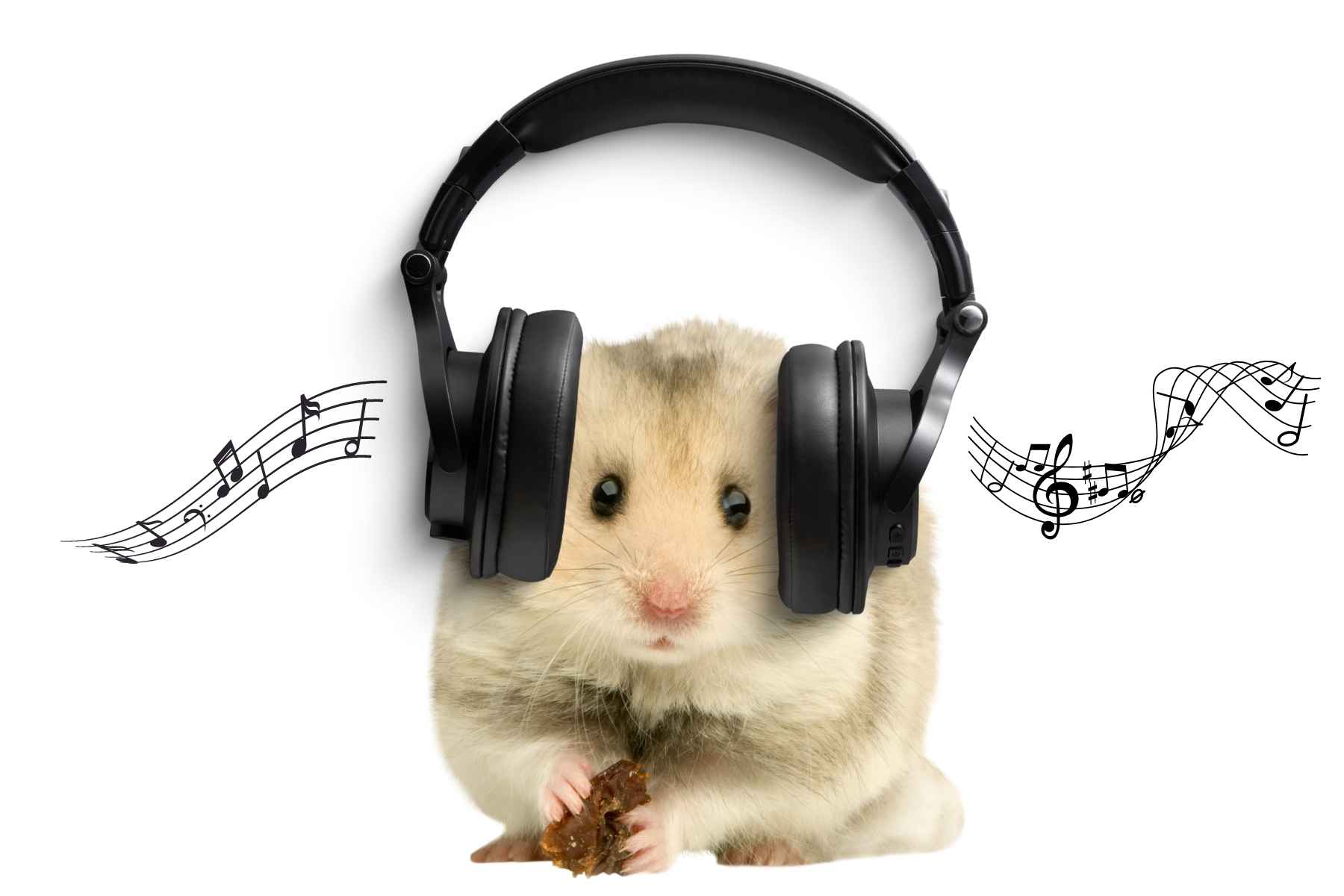Do Hamsters Like Music?

The hamster is a common household pet for people, but you may be surprised to uncover the fun moments that come with owning one!
Hamster owners looking to make the most out of their pet’s happiness may even find themselves pondering: Do hamsters like music?
Research shows that hamsters do like music! Auditory stimuli can make a huge difference in your hamster’s temperament, so choosing the right music (and knowing the best way to play it) can impact your pet’s life for the better.
Is that not incredible to find out? Discover the magical effect that music has on hamsters, the best way to introduce them to favorite tunes, and more in this article.
Hamsters Liking Music For Auditory Stimuli
While tiny, hamsters have very complex brain systems. They have thoughts and personalities and respond to various types of stimulation.
Unfortunately, hamsters don’t have the strongest eyesight, so they must rely on their other senses to tell them about their environment. However, they tend to have a considerable reliance on auditory stimulants.
Hamsters, like all rodents, have extremely sensitive eardrums, hearing all noises between 200 hertz to 80 or 90 kilohertz. Of course, non-domesticated animals use this gift for their sense of survival, but your pet hamster is domesticated, meaning you can use it to show them the gift of music!
Research has shown that rodents, including hamsters, react extremely positively towards music stimuli. Experimenters took 42 rodents, kept some of them as controls, and exposed the rest to individually picked hamster playlists!
The music ranged from Mozart to hard rock, and the results stunned: music-exposed hamsters saw a significant spike in neuro-chemistry!
It was a groundbreaking discovery. Not only does this mean that your hamster gets less stressed and more relaxed through listening to music, but it means you could see positive changes in the following bodily functions:
- Neuron Production Consider listening to music as an exercise for your hamster’s brain! Frequent listening can improve your pet’s logical thinking, making it easier to respond to tricks and other exciting stimuli.
- Neurological Experience-Adapting
- Spatial Learning Help your hamster become more comfortable in their environment by playing music while they’re in their space. Due to the brain stimulation from listening to tunes, they can better understand environmental cues.
- Auditory Learning
- Increased Immune System
- Regulated Blood Pressure
- Parasympathetic Nervous System Activity This body system is responsible for ensuring actions like sleep and digestion go smoothly, so keeping it running smoothly can save your hamster from discomfort.
It turns out listening to music won’t just be fun for your hamsters. It can be good for them too!
Choosing The Right Music For Your Hamster
Music fans can attest that different situations call for different types of tunes. For example, you probably wouldn’t whip out your classical music playlist during your next gym session, just like you wouldn’t blast Metallica when you go to sleep. The same rule applies to your hamster. They’ll appreciate the music if it corresponds to the situation.
Looking to keep your hamster active? Play music with vocals, beats, and complex rhythms. Rock and hard rock can be played, but be extra mindful about those sensitive eardrums we mentioned previously!
Something uplifting and exciting, with a lot of fun noises, can keep your pet alert and willing to exercise. We recommend playing pop or techno music in these cases.
You can also call on music to help your hamster go to sleep or get some TLC post-workout. Think about the kind of music you like to listen to when you unwind. It’s probably something quiet, not too harsh of a beat, and not too many instruments. Your hamster will enjoy the same type of sounds during their rest. You can even play a white-noise ambiance!
Whatever music you put on for your pet, there are some crucial factors to keep in mind. Never suddenly blast music, and never play music with sudden drops or breakdowns (that means your hamster probably won’t appreciate you playing dubstep).
Hamsters have notably fragile hearts and shouldn’t be exposed to noises that may stress them, so be careful!
Hamsters And Loving Classical Music
Researchers in the experiment mentioned above found that the most health benefits and positive outcomes were borne from rodents who listened to classical music.
Humans know of classical music to be relaxing and calming, but for hamsters, it can be the most versatile, complex genre of melodies we can show them.
While entirely instrumental, the intricate style of classical music can provide enough stimuli for your hamster to enjoy listening to it during a range of different activities.
Music by Mozart, Beethoven, and Bach have quick, almost angry-sounding tempos that work well for exercising your hamster, while composers like Debussy and Brahms are great for naptime.
The best part about classical music is that it’s made up of different features that your hamster will respond positively towards:
- Naturally Soothing Almost all classical compositions have mellow undertones- even ones that may be considered loud or angry. This means that parts of the song that are considered “high intensity” aren’t all that intense at all, meaning your hamster can safely listen to one of your playlists the entire way through.
- Gradual Swells No sudden music here! You and your hamster don’t have to worry about being caught off guard by loud noises or drops.
- No Vocals The melody of classical music is the main focus. There’s no need to be confused by distorting from added vocals.
- Lots Of Vibration The vibrations from the different tones in classical music can give your hamster some physical stimulation to look forward to as well.
How To Effectively Play Music For Your Hamster
While it would be a lot easier, you can’t just put your music on full blast and leave your hamster to its own devices.
Not only would this scare your pet, but you could also be doing some unknowing damage to their fragile bodies! When playing tunes for your pet, there are some things to keep in mind that will make the experience better suited for their species.
You’re at an advantage if you’re lucky enough to raise your hamster from its pup stages (around six weeks old)!
Taking the time to expose your hamster to music while they’re young allows them to grow used to being around it. They’ll consider it a part of their environment and be less likely to think of it as “dangerous” or a threat.
Regardless of age, though, there is a right and wrong way to play music around your hamster. The first thing to remember is that they should never be near whatever device you’re using to play music.
Don’t leave your phone next to their cage, and do not place them directly in front of your speaker. Allow them the chance to distance themselves.
You probably have a favorite song or artist that you can’t help but want to blast at full capacity.
Though your hamster may favor a certain tune over another, they definitely don’t want to listen to it at rocket high volumes!
This could hurt or potentially rupture their eardrums, causing irreversible damage. Be safe and keep the volume on the lower end of the spectrum.
Hamsters Making Positive Associations With Music
Hamsters are much smarter than you may think and are quick to make associations between stimuli, their environment, and who may be around them when those stimulants are present.
This means they can be taught tricks, recognize their own name, and can consider hearing music as a positive form of stimuli!
When you first get your hamster, you may try to look for ways to form a bond with your pet. It can help them recognize you as their owner and consider you a trustworthy figure in their lives.
Playing music around your hamster, and keeping it off when you leave the room, can help them make a connection between a pleasant stimulus and your presence.
Outside of forming a loving bond with you, hamsters will also understand that certain types of music warrant a specific reaction from them. To do this, stick to playing certain playlists during key moments in your hamster’s day.
When your hamster hears certain songs, they’ll understand that it’s time to hop on the wheel or tuck in for the night!
Though showing your hamster music may initially be just a fun thing for them, setting them up with a recognizable routine benefits both of you!
It’ll strengthen your bond, set a schedule that you can understand and upkeep, and it can keep your hamster from keeping you up during all hours of the night. A routine lessens the stress for both you and your pet.
Conclusion
When people say music is healing, they probably don’t know that that saying applies to hamsters too!
Not only can listening to music make your hamster happy, but it can also keep them healthy, regulated, and closer to you as their owners.






